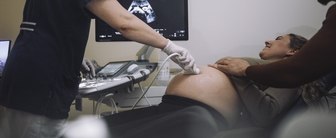A recent YouGov poll of 2,000 Americans explored the experiences of menopause among more than 500 women who say they are in one of the three stages of menopause: transitioning into menopause, menopausal, or postmenopausal. The poll finds that women who have been through at least one of these stages of menopause are more likely to describe their experiences with menopause thus far as negative rather than positive, with many saying they've experienced hot flashes, difficulty sleeping, and mood changes.
Among women who have completed menopause — that is, who are postmenopausal — 36% describe the experience of menopause as very or somewhat negative, while 25% describe it positively and 37% say it was neither negative nor positive. Women who are currently experiencing menopause or are perimenopausal — that is, going through the transition into menopause — are somewhat more likely to describe the experience negatively compared to people who have fully completed menopause. (The poll found that among women in some stage of menopause, 17% are perimenopausal, 21% are menopausal, and 62% are postmenopausal.
A separate portion of the poll asked Americans about their early experiences with menstrual periods. Looking at how responses to this question compare to responses about experiences with menopause, we find a correlation in how people describe the two experiences. People who describe their first period as a positive experience are more likely to describe their experience with menopause positively, while people who say their first period was a negative experience are more likely to say the same about their experience thus far with menopause.
One-third (32%) of women who are menopausal or postmenopausal say they stopped having a period between the ages of 50 and 54 while 46% say their periods stopped prior to 50 and 19% say they stopped at age 55 or older.
Nearly three-quarters (72%) of women who have experienced at least one stage of menopause say they have experienced symptoms related to menopause. The menopause symptoms most likely to have been experienced, from a list of eight, are hot flashes, night sweats, difficulty sleeping, mood changes, and vaginal dryness, all of which were experienced by half of women with symptoms or more. About one-third of women who have symptoms of menopause say their symptoms include each of memory problems, or joint pain or stiffness.
Three in five American women who have experienced at least one stage of menopause and experienced symptoms say they've sought out at least one treatment to address their symptoms. Nearly one in three (31%) have used over-the-counter medication and 21% have made lifestyle changes. About one in four (24%) have received hormone therapy, and 16% have used other prescription medications.
One-quarter (26%) of women who are going through or have been through menopause say there is "a great deal" or "a lot" of stigma around menopause in the United States, while 33% say there is "some" and 29% say there is "hardly any" or "none at all." Women overall share roughly the same view.
One in three women (33%) who are currently menopausal say they've felt embarrassed about going through menopause; just 13% of women who are postmenopausal say they've felt embarrassed.
Note: Responses to questions on experiences with menopause and menstruation are limited to women in this analysis. This decision was aimed at ensuring data accuracy. However, this approach may not capture the experiences of people who identify as non-binary or transgender and also experience or have experienced menopause or menstruation.
— Carl Bialik and Linley Sanders contributed to this article
See the results for this YouGov poll
Methodology: The poll was conducted among 2,000 U.S. adult citizens on two separate surveys from March 7 - 10, 2023 and March 8 - 12, 2023, with each survey taken by 1,000 U.S. adult citizens. Respondents were selected from YouGov’s opt-in panel using sample matching. A random sample (stratified by gender, age, race, education, geographic region, and voter registration) was selected from the 2019 American Community Survey. The sample was weighted according to gender, age, race, education, 2020 election turnout and presidential vote, baseline party identification, and current voter registration status. Demographic weighting targets come from the 2019 American Community Survey. Baseline party identification is the respondent’s most recent answer given prior to March 15, 2022, and is weighted to the estimated distribution at that time (33% Democratic, 28% Republican). The margin of error for the overall sample is approximately 2%.
Image: Adobe Stock (pucko_ns)











